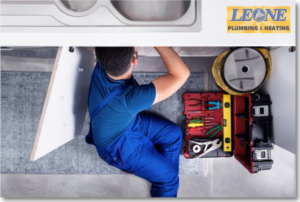 Are you facing plumbing issues in Rochester, NY? Finding a reliable plumber can be a daunting task, especially when you need urgent help. Don’t worry, we’ve got you covered! If you’re searching for reliable plumbers in Rochester, NY, look no further than Leone Plumbing & Heating. We are known for our trusted, high-quality plumbing service.
Whether it’s a leaky faucet, a clogged drain, or a major plumbing emergency, you deserve a professional plumber who can provide effective and efficient solutions. Leone Plumbing is a go-to company for both residential and business plumbing needs. Whether it’s a routine repair, an emergency issue, or a major installation, our experienced team is dedicated to providing efficient, professional, and affordable solutions.
Are you facing plumbing issues in Rochester, NY? Finding a reliable plumber can be a daunting task, especially when you need urgent help. Don’t worry, we’ve got you covered! If you’re searching for reliable plumbers in Rochester, NY, look no further than Leone Plumbing & Heating. We are known for our trusted, high-quality plumbing service.
Whether it’s a leaky faucet, a clogged drain, or a major plumbing emergency, you deserve a professional plumber who can provide effective and efficient solutions. Leone Plumbing is a go-to company for both residential and business plumbing needs. Whether it’s a routine repair, an emergency issue, or a major installation, our experienced team is dedicated to providing efficient, professional, and affordable solutions.
Why Is It Important To Find Reliable Plumbers In Rochester, NY?
 Plumbing issues can be a significant source of stress and inconvenience for homeowners and businesses alike. Whether it’s a leaky faucet, a clogged drain, or a major pipe burst, these problems can quickly escalate and cause significant damage to your property if not addressed promptly and effectively. That’s why finding a reliable plumber who can provide high-quality, professional services is crucial.
Plumbing issues can be a significant source of stress and inconvenience for homeowners and businesses alike. Whether it’s a leaky faucet, a clogged drain, or a major pipe burst, these problems can quickly escalate and cause significant damage to your property if not addressed promptly and effectively. That’s why finding a reliable plumber who can provide high-quality, professional services is crucial.
A reliable plumber can not only fix the immediate problem but also identify and address the root cause, preventing future issues from arising. They possess the necessary skills, experience, and equipment to diagnose and resolve a wide range of plumbing problems efficiently. A trustworthy plumber offers transparent pricing, reliable work, and excellent service, minimizing disruption to your life.
That is why at Leone Plumbing, we proudly deliver top-quality plumbing services for businesses and residents in Rochester, NY. With years of experience, we’ve built a reputation as reliable expert plumbers in Rochester, NY, solving problems efficiently. Our skilled professionals have the knowledge and tools to ensure your plumbing systems run smoothly. Our goal is to provide you with quality plumbing service so you can enjoy peace of mind, knowing that your home or business plumbing system is in good hands.
Common Plumbing Problems In Rochester, NY
Rochester, NY, like many other cities, is not immune to a variety of plumbing issues that can arise in both residential and commercial properties. Here are some of the most common plumbing problems that Leone Plumbing encountered and worked on in the area.
Clogged drains:
Whether it’s a slow-draining sink, a backed-up toilet, or a blocked sewer line, clogged drains are a common problem in Rochester. Hair buildup, soap scum, food debris, or invading tree roots can cause these blockages.
Leaky faucets and pipes:
Leaks can occur in various parts of the plumbing system, from faucets and showerheads to hidden pipes within the walls or under the sink. These leaks can not only waste water and increase utility bills but also lead to water damage if left unattended.
Water heater issues:
Rochester’s cold winters can put a strain on water heaters, leading to problems such as lack of hot water, strange noises, or even complete failure. Proper maintenance and timely repairs are essential to ensure a reliable hot water supply.
Frozen pipes:
The harsh winters in Rochester can cause pipes to freeze, leading to burst pipes and costly water damage. Homeowners must be proactive in insulating and protecting their plumbing systems to prevent this issue.Sewer line problems:
Tree roots, debris, or even shifting soil can cause issues with the main sewer line, leading to backups, clogs, and even complete blockages. These problems can be particularly challenging and require the expertise of a professional plumber.
By understanding the common plumbing problems in the Rochester area, homeowners and business owners can be better prepared to address them promptly and for us (Leone Plumbing) to efficiently resolve these plumbing concerns. Addressing these issues early can prevent further damage and costly repairs down the line.
What Makes Leone Plumbing Reliable?
You might be wondering why you should choose us for your plumbing repairs or remodeling project. Is Leone Plumbing and Heating a reliable plumbing service in Rochester, NY? Well, when it comes to finding reliable plumbers in Rochester, NY, there are several important factors to consider. We tick all of the following boxes when it comes to identifying a trustworthy professional plumbing service.Licenses And Certifications ☑️
One of the first things to look for when choosing a plumber is their licensing and certifications. In New York, plumbers are required to be licensed by the state, and it’s essential to ensure that the plumber you hire is properly licensed and insured. This not only ensures that they have the necessary skills and training to perform the work but also provides you with protection in case of any accidents or damages.
Leone Plumbers has all the necessary licenses and certifications, ensuring that our team meets the highest industry standards. This makes us a trusted and reliable plumbing service in Rochester, NY. Our qualifications guarantee that your plumbing projects are handled by professionals who are fully trained, experienced, and committed to delivering top-quality results.
Customer Reviews and Testimonials Online ☑️
Online reviews and testimonials can provide valuable insights into a plumber’s work quality, customer service, and reliability. Take the time to research plumbers in the Rochester area and read through reviews from past clients. Leone Plumbing and Heating, for instance, holds satisfactory reviews from our clients. Take a look at the following reviews for Leone Plumbing!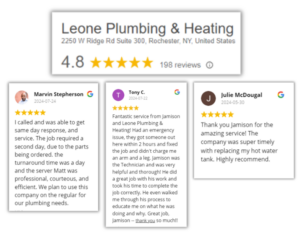
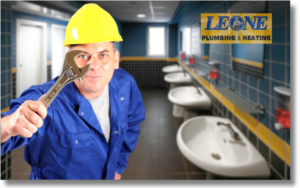
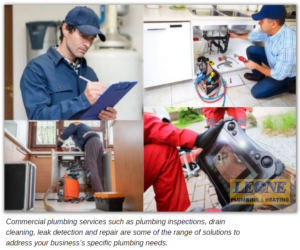
 Outsourcing commercial plumbing services also allows businesses to focus on their core operations, rather than diverting valuable resources to manage and maintain their plumbing infrastructure. This can lead to improved productivity, enhanced customer satisfaction, and a more streamlined overall operation. Additionally, commercial plumbing contractors often provide 24/7 emergency services, ensuring that any plumbing-related issues can be addressed promptly, minimizing downtime and disruptions. So if you are a business and looking for commercial plumbing services in the Rochester New York area,
Outsourcing commercial plumbing services also allows businesses to focus on their core operations, rather than diverting valuable resources to manage and maintain their plumbing infrastructure. This can lead to improved productivity, enhanced customer satisfaction, and a more streamlined overall operation. Additionally, commercial plumbing contractors often provide 24/7 emergency services, ensuring that any plumbing-related issues can be addressed promptly, minimizing downtime and disruptions. So if you are a business and looking for commercial plumbing services in the Rochester New York area, 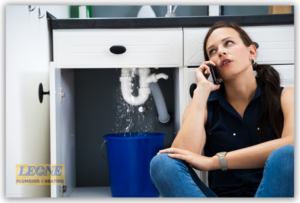 Dealing with a plumbing emergency can be a frantic and overwhelming experience. Burst pipes, overflowing toilets, or clogged drains can quickly turn your home into a chaotic mess. However, staying calm and taking immediate action is crucial to prevent further damage. Today, we will provide tips to help you confidently navigate plumbing emergencies. With a focus on staying calm and fixing the chaos, we will guide you through step-by-step solutions to common plumbing issues, ensuring that you have the knowledge to handle these situations effectively.
Dealing with a plumbing emergency can be a frantic and overwhelming experience. Burst pipes, overflowing toilets, or clogged drains can quickly turn your home into a chaotic mess. However, staying calm and taking immediate action is crucial to prevent further damage. Today, we will provide tips to help you confidently navigate plumbing emergencies. With a focus on staying calm and fixing the chaos, we will guide you through step-by-step solutions to common plumbing issues, ensuring that you have the knowledge to handle these situations effectively.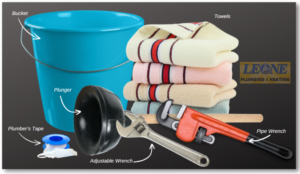 Now that you know the importance of staying calm during a plumbing emergency, let us explore the essential tools that you need. Having the right tools readily available can make all the difference in efficiently resolving a plumbing emergency. Here are some essential tools you should have in your toolkit:
Now that you know the importance of staying calm during a plumbing emergency, let us explore the essential tools that you need. Having the right tools readily available can make all the difference in efficiently resolving a plumbing emergency. Here are some essential tools you should have in your toolkit:
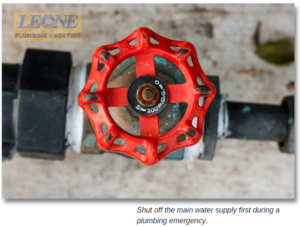
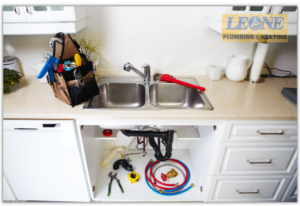 Having a clean and functional drainage system is essential for a smooth-running household. However, over time, debris, grease, hair, and other materials can accumulate in your pipes, leading to clogs and potential damage. That is why regular residential drain cleaning is essential for a clean and well-maintained drainage system. If you are tired of dealing with stubborn clogs and plumbing issues in your residential drains, this article is for you! Don’t let clogged drains disrupt your daily routine. Follow our guide and experience the relief of a clog-free living space.
Having a clean and functional drainage system is essential for a smooth-running household. However, over time, debris, grease, hair, and other materials can accumulate in your pipes, leading to clogs and potential damage. That is why regular residential drain cleaning is essential for a clean and well-maintained drainage system. If you are tired of dealing with stubborn clogs and plumbing issues in your residential drains, this article is for you! Don’t let clogged drains disrupt your daily routine. Follow our guide and experience the relief of a clog-free living space.
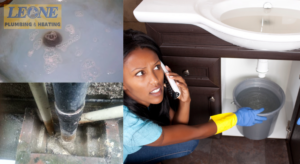 Identifying a clogged drain early on is crucial for preventing further damage and resolving the issue promptly. If you notice any of these signs, it’s important to address the issue promptly to prevent further damage.
Identifying a clogged drain early on is crucial for preventing further damage and resolving the issue promptly. If you notice any of these signs, it’s important to address the issue promptly to prevent further damage.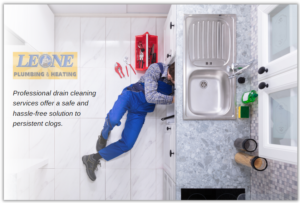
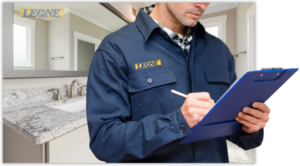 Maintaining a home is important for the safety and comfort of your family. As a good maintenance practice, it is a good idea to have your home inspected once in a while to avoid any plumbing issues. It is also recommended for older homes which are vulnerable to deterioration. However, maintaining a home can be challenging, especially in those hard-to-reach and concealed areas such as your plumbing system. In this blog, we will get to know more about plumbing inspection and what it entails.
Maintaining a home is important for the safety and comfort of your family. As a good maintenance practice, it is a good idea to have your home inspected once in a while to avoid any plumbing issues. It is also recommended for older homes which are vulnerable to deterioration. However, maintaining a home can be challenging, especially in those hard-to-reach and concealed areas such as your plumbing system. In this blog, we will get to know more about plumbing inspection and what it entails.

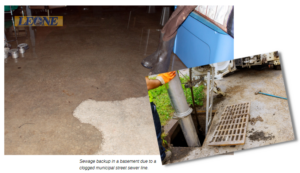
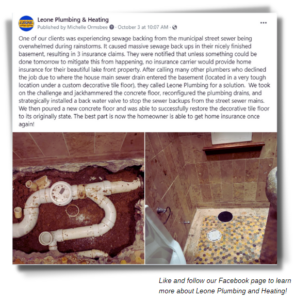 We recently had a client who experienced sewage backing up from the municipal street sewer being overwhelmed during rainstorms. It caused massive sewage backups in their nicely finished basement. This often occurs when the municipal sewage system is overloaded with water and the sewage eventually backs up through the basement floor. Although a municipal sewer line can handle loads of water, excessive rain can still overload the system. So as soon as you see dripping water on your basement floor, contact a professional plumber to check and fix the issue before it gets worse! It’s also important to contact the local public work office in the municipality if the issue persists.
We recently had a client who experienced sewage backing up from the municipal street sewer being overwhelmed during rainstorms. It caused massive sewage backups in their nicely finished basement. This often occurs when the municipal sewage system is overloaded with water and the sewage eventually backs up through the basement floor. Although a municipal sewer line can handle loads of water, excessive rain can still overload the system. So as soon as you see dripping water on your basement floor, contact a professional plumber to check and fix the issue before it gets worse! It’s also important to contact the local public work office in the municipality if the issue persists.
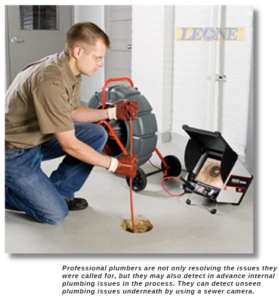 Proper plumbing maintenance is still a good method of prevention. We suggest that you schedule a sewer line inspection with a trusted plumbing professional to check the condition of your sewer lines. We also advise that you do a regular pipe cleaning to prevent any clogs that can cause serious backups. Avoid fat, oils, and other solid materials from flowing down the drain as it can also cause blockages that trigger sewage backup.
Proper plumbing maintenance is still a good method of prevention. We suggest that you schedule a sewer line inspection with a trusted plumbing professional to check the condition of your sewer lines. We also advise that you do a regular pipe cleaning to prevent any clogs that can cause serious backups. Avoid fat, oils, and other solid materials from flowing down the drain as it can also cause blockages that trigger sewage backup.